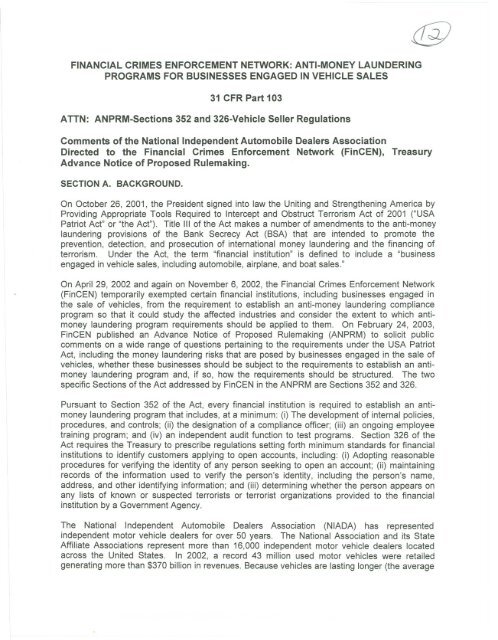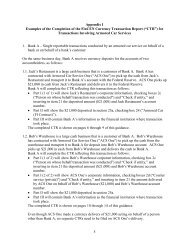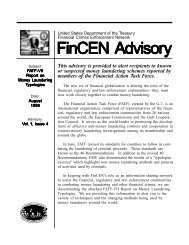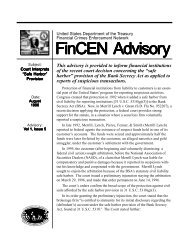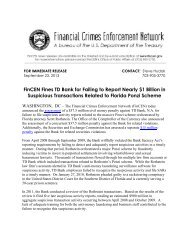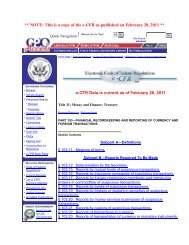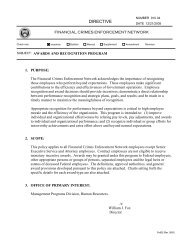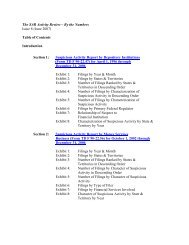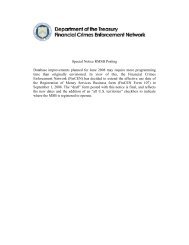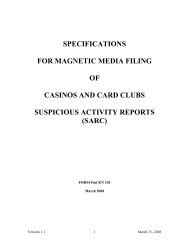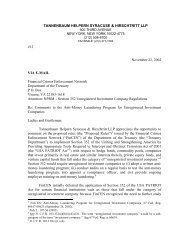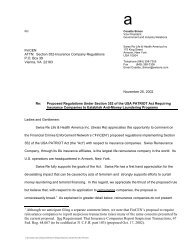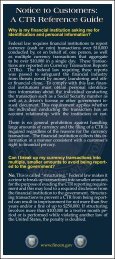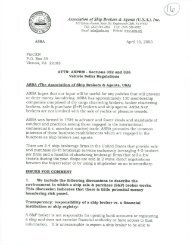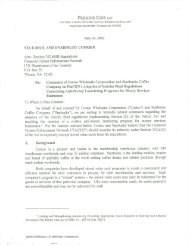anti-money laundering - FinCEN
anti-money laundering - FinCEN
anti-money laundering - FinCEN
Create successful ePaper yourself
Turn your PDF publications into a flip-book with our unique Google optimized e-Paper software.
FINANCIAL CRIMES ENFORCEMENT NETWORK: ANTI-MONEY LAUNDERING<br />
PROGRAMS FOR BUSINESSES ENGAGED IN VEHICLE SALES<br />
31 CFR Part 103<br />
ATTN: ANPRM-Sections 352 and 326-Vehicle Seller Regulations<br />
@<br />
Comments of the National Independent Automobile Dealers Association<br />
Directed to the Financial Crimes Enforcement Network (<strong>FinCEN</strong>), Treasury<br />
Advance Notice of Proposed Rulemaking.<br />
SECTION A. BACKGROUND.<br />
On October 26, 2001, the President signed into law the Uniting and Strengthening America by<br />
Providing Appropriate Tools Required to Intercept and Obstruct Terrorism Act of 2001 ("USA<br />
Patriot Act" or "the Act"). Title III of the Act makes a number of amendments to the <strong>anti</strong>-<strong>money</strong><br />
<strong>laundering</strong> provisions of the Bank Secrecy Act (BSA) that are intended to promote the<br />
prevention, detection, and prosecution of international <strong>money</strong> <strong>laundering</strong> and the financing of<br />
terrorism. Under the Act, the term "financial institution" is defined to include a "business<br />
engaged in vehicle sales, including automobile, airplane, and boat sales."<br />
On April 29, 2002 and again on November 6, 2002, the Financial Crimes Enforcement Network<br />
(<strong>FinCEN</strong>) temporarily exempted certain financial institutions, including businesses engaged in<br />
the sale of vehicles, from the requirement to establish an <strong>anti</strong>-<strong>money</strong> <strong>laundering</strong> compliance<br />
program so that it could study the affected industries and consider the extent to which <strong>anti</strong><strong>money</strong><br />
<strong>laundering</strong> program requirements should be applied to them. On February 24, 2003,<br />
<strong>FinCEN</strong> published an Advance Notice of Proposed Rulemaking (ANPRM) to solicit public<br />
comments on a wide range of questions pertaining to the requirements under the USA Patriot<br />
Act, including the <strong>money</strong> <strong>laundering</strong> risks that are posed by businesses engaged in the sale of<br />
vehicles, whether these businesses should be subject to the requirements to establish an <strong>anti</strong><strong>money</strong><br />
<strong>laundering</strong> program and, if so, how the requirements should be structured. The two<br />
specific Sections of the Act addressed by <strong>FinCEN</strong> in the ANPRM are Sections 352 and 326.<br />
Pursuant to Section 352 of the Act, every financial institution is required to establish an <strong>anti</strong><strong>money</strong><br />
<strong>laundering</strong> program that includes, at a minimum: (i) The development of internal policies,<br />
procedures, and controls; (ii) the designation of a compliance officer; (iii) an ongoing employee<br />
training program; and (iv) an independent audit function to test programs. Section 326 of the<br />
Act requires the Treasury to prescribe regulations setting forth minimum standards for financial<br />
institutions to identify customers applying to open accounts, including: (i) Adopting reasonable<br />
procedures for verifying the identity of any person seeking to open an account; (ii) maintaining<br />
records of the information used to verify the person's identity, including the person's name,<br />
address, and other identifying information; and (iii) determining whether the person appears on<br />
any lists of known or suspected terrorists or terrorist organizations provided to the financial<br />
institution by a Government Agency.<br />
The National Independent Automobile Dealers Association (NIADA) has represented<br />
independent motor vehicle dealers for over 50 years. The National Association and its State<br />
Affiliate Associations represent more than 16,000 independent motor vehicle dealers located<br />
across the United States. In 2002, a record 43 million used motor vehicles were retailed<br />
generating more than $370 billion in revenues. Because vehicles are lasting longer (the average
-----<br />
vehicle on the road today is over 8.5 years old), projections of future used vehicle sale volumes<br />
suggest that the used vehicle market will maintain its 40-million-plus volume in the years to<br />
come.1 Given the number of used motor vehicle transactions thattake place each year, a rule<br />
requiring the establishment of an <strong>anti</strong>-<strong>money</strong> <strong>laundering</strong> program could have a significant<br />
impact on the used motor vehicle industry? Therefore, NIADA is submitting comments in<br />
response to the ANPRM and a recommendation that motor vehicle dealers who engage in the<br />
purchase and resale of motor vehicles be exempt from the requirements to establish an <strong>anti</strong><strong>money</strong><br />
<strong>laundering</strong> program under the USA Patriot Act. Alternatively, in the event that <strong>FinCEN</strong><br />
determines that exempting motor vehicle dealers from the requirements is not appropriate,<br />
NIADA urges <strong>FinCEN</strong> to adopt flexible requirements thct will permit motor vehicle dealers to<br />
design their programs to meet the specific risks presented by the dealer's business, including a<br />
"reasonable policies and procedures" standard and related guidelines, rather than a specific<br />
rule.<br />
SECTION B. RESPONSES TO FINCEN'S REQUEST FOR PUBLIC COMMENTS ON THE<br />
MONEY LAUNDERING RISKS POSED BY BUSINESSES ENGAGED IN THE SALE OF<br />
VEHICLES.<br />
1. Motor Vehicle Dealers Should Be Exempt From Coverage Under Sections 352 And<br />
326 Of The USA Patriot Act Because The Potential Money Laundering Risks Do<br />
Not Warrant The Burden Of Additional Regulations.<br />
Having recognized that the businesses engaged in the sale of vehicles as defined in the Act<br />
includes a wide range of entities that vary drastically in function and practice, including size, the<br />
types of transactions they engage in, the types of entities with which they do business and the<br />
capital and business risks at stake, the threshold issue posed by <strong>FinCEN</strong> is the extent to which<br />
businesses engaged in the sale of vehicles pose a significant risk of <strong>money</strong> <strong>laundering</strong>.<br />
Specifically, <strong>FinCEN</strong> has solicited comments regarding the types of risks in the products that<br />
businesses engaged in the sale of vehicles provide that make them uniquely susceptible to<br />
<strong>money</strong> <strong>laundering</strong>, as opposed to the risks inherent in all businesses that sell products or<br />
services to the public that may be purchased with tainted funds. It is NIADA's position that<br />
motor vehicle dealers are less vulnerable to <strong>money</strong> <strong>laundering</strong> and financing a transaction for a<br />
terrorist than other industries, in part because motor vehicles cannot be easily transported all<br />
over the world or easily converted into cash. Additionally, ownership of a motor vehicle is<br />
evidenced by a certificate of title and motor vehicle dealers are subjectto numerous federal and<br />
state laws that make it difficult for individuals to distance themselves from these transactions.<br />
Two practices specifically mentioned by <strong>FinCEN</strong> include the practice of cleansing illegal<br />
proceeds by introducing them into the financial system and then distancing the illegal funds from<br />
their criminal source through the creation of complex layers of financial transactions. The<br />
example suggested in the Comments was trading in vehicles for other vehicles and engaging in<br />
successive transactions of buying and selling both new and used vehicles. However, a key<br />
distinction between the buying and selling of other products and services whereby this may be a<br />
feasible system and the buying and selling of motor vehicles is that an ownership interest in a<br />
motor vehicle is evidenced by a certificate of title. When a motor vehicle is sold to a retail<br />
The 2003 Used Car Market Report, Manheim Auctions, 1400 Lake Hearn Drive, NE, Atlanta, GA<br />
30319-1464.<br />
2 The scope of this Comment is limited to the potential impact the establishment of an <strong>anti</strong>-<strong>money</strong><br />
<strong>laundering</strong> program will have on motor vehicle dealerships that engage in the wholesale and retail sale of<br />
automobiles.<br />
2
--------<br />
customer, a motor vehicle dealer is required to file documentation with the appropriate state<br />
agency to obtain a certificate of title in the name of the buyer, in addition to executing a sworn<br />
odometer statement mandated by the Federal and various State Odometer Disclosure Acts<br />
This process is repeated each time ownership in a motor vehicle is transferred to another<br />
person or entity, thereby creating a permanent record identifying each transferor and transferee<br />
of the vehicle.<br />
In addition to certificate of title laws, motor vehicle dealersmust comply with a collective total of<br />
over 900 Federal and State Laws and Regulations, including requirements to maintain credit<br />
related documents, sales and lease contracts, statements regarding cash proceeds, and daily<br />
sales summaries, for a period of time extending anywhere from two to six years~ These Laws<br />
and Regulations obligate motor vehicle dealers to obtain specified information from their<br />
customers, make mandated disclosures, and ensure that records are stored and maintained for<br />
the appropriate period of time. Before a dealer permits a customer to take a vehicle for a test<br />
drive, the customer must enter into a written agreement that contains terms related to his use of<br />
the vehicle, provide a valid driver's license, proof of insurance and meet any other financial<br />
responsibility requirements imposed by the dealer's insurance carrier and/or state law. When a<br />
motor vehicle is sold, virtually all State Motor Vehicle Codes and State Unfair and Deceptive<br />
Acts and Practices (UDAP) Statutes mandate that all retail and wholesale transactions be<br />
evidenced by a written document that contains the identity of and all the agreements of the<br />
parties. Information obtained from a retail customer to verify his identity includes his address,<br />
home and work telephone numbers, social security number, birth date and a copy of his driver's<br />
license or other state issued picture identification.<br />
Since the vast majority of motor vehicle transactions are financed, motor vehicle dealers<br />
typically obtain additional information from their customers to verify their creditworthiness. Such<br />
information includes a copy of the customer's credit report, information pertaining to his<br />
employment history, credit references and, in some cases, copies of pay stubs to verify<br />
employment and income. By agreement with the dealer, outside lending sources, such as<br />
banks, credit unions and finance companies usually require the dealer to warrant that it will<br />
comply with applicable laws, verify the identity of the buyer and the legitimacy of the transaction,<br />
and take steps to ensure that any payments made in connection with the transaction are paid by<br />
the buyer, not a third party. In addition to its contractual obligations, a motor vehicle dealer<br />
must also comply with a number of Federal and State Laws that govern the financing portion of<br />
a purchase transaction. The Equal Credit Opportunity Act and Fair Credit Reporting Acts<br />
require motor vehicle dealers to retain copies of credit applications, supplemental information<br />
used in evaluating applicants, and written notifications related to the request for credit; the Truth<br />
in Lending Act/Regulation Z and Truth in Leasing Act/ Regulation M mandate that consumers be<br />
provided with and that dealers maintain copies of disclosure statements; and State Retail<br />
Installment Sales Acts mandate that all of the agreements of the parties with respect to the<br />
financing portion of the transaction be incorporated into the finance contract between the<br />
parties.<br />
In the rare instances when a customer pays cash for the purchase of a motor vehicle, motor<br />
vehicle dealers are subject to additional disclosure and reporting requirements. For example,<br />
under most State UDAP Statutes any time a motor vehicle dealer accepts a cash payment,<br />
whether it be for a deposit, partial payment or payment in full, it typically must be evidenced by a<br />
receipt from the dealer that specifies the amount paid,the method of payment, the name of the<br />
individual payee, the name of the entity accepting the payment and a description of the products<br />
3 Guide to Record Retention Requirements, G.P.O., Washington, D.C. 20402.<br />
3
- n- -- -- -- -- ----<br />
and services being purchased. If a motor vehicle dealer receives more than $10,000 in cash in<br />
any single or series of related transactions, it is also subject to federally mandated reporting<br />
requirements under Section 365 of the USA Patriot Act and pre-existing cash reporting laws.<br />
Section 365 of the USA Patriot Act mandates that motor vehicle dealers file a report with<br />
<strong>FinCEN</strong> anytime they receive more than $10,000 in cash in one transaction (or two or more<br />
related transactions). Section 365 also prohibits dealers from structuring a transaction to avoid<br />
the cash reporting requirements. The Form, titled "IRS Form 8300/<strong>FinCEN</strong> Form 8300," is<br />
virtually identical to the IRS Form 8300 that motor vehicle dealers are required to complete<br />
pursuant to a similar provision under the Internal Revenue Code. Now they are required to<br />
report to <strong>FinCEN</strong> as well as the IRS. In fact, the IRS issued a Rule amending its regulations to<br />
clarify that the information reported to the IRS on cash transactions is also required to be<br />
reported to <strong>FinCEN</strong>. The penalties for failing to file the Form 8300 with <strong>FinCEN</strong> or otherwise<br />
evading the filing requirements are subst<strong>anti</strong>al, including fines, seizure of assets and, in some<br />
cases, imprisonment. As a result, motor vehicle dealers have taken steps not only to ensure<br />
that transactions involving payments of more than $10,000 in cash are reported, but alsoto<br />
implement policies and procedures designed to prevent structuring such transactions in a<br />
manner designed to evade the reporting requirements.<br />
During the past year, motor vehicle dealers across the United States have also adopted<br />
procedures to determine whether their customers appear on any lists of known or suspected<br />
terrorists issued by the Federal Government. Pursuant to the International Emergency<br />
Economic Powers Act and Executive Order 13224, U.S. citizens are prohibited from entering<br />
into "any transaction or dealing" with individuals or entities identified either in the Executive<br />
Order, by the Department of Treasury or by the Secretaries of State as posing a significant risk<br />
of committing terrorist acts or providing support to these organizations or individuals. In order to<br />
comply with the Executive Order, motor vehicle dealers have taken steps varying from<br />
downloading the master list of Specially Designated Nationals and Blocked Persons and<br />
applicable updates maintained by the Office of Foreign Asset Control (OFAC) to paying fees to<br />
credit bureaus to run checks on their behalf.<br />
Effective as of September 26, 2002, motor vehicle dealers have had to establish a mechanism<br />
for law enforcement agencies to communicate the names of suspected terrorists and <strong>money</strong><br />
launders to facilitate efforts to locate and secure accounts and transactions involving those<br />
suspects as well. The Treasury Department issued a Final Rule implementing Section 314 of<br />
the USA Patriot Act, which establishes procedures that encourage information sharing between<br />
governmental authorities and financial institutions, and among financial institutions themselves.<br />
Any motor vehicle dealership that receives the name of a suspect must designate one person at<br />
the dealership to be the contact person regarding the request and any future requests that it<br />
receives. A motor vehicle dealer must be prepared to provide <strong>FinCEN</strong> with the contact person's<br />
name, title, mailing address, e-mail address, telephone number and facsimile number. The<br />
contact person must also be able to search both current and past account and transaction<br />
records for the names provided and report the applicable information if the dealer has entered<br />
into a transaction with an individual or entity on the list, including account numbers, the date and<br />
type of each transaction, and the social security number, taxpayer identification number,<br />
passport number, date of birth, address, or other identifying information provided by the<br />
individual or entity at the time of the transaction.<br />
Finally, motor vehicle dealers are in the process of developing programs to comply with security<br />
requirements mandated by the Federal Trade Commission's Safeguards Rule, which was<br />
promulgated pursuant to the Gramm-Leach-Bliley Act. By May 23, 2003, motor vehicle dealers<br />
4
~ u-<br />
~ U -- ~- U<br />
d -----<br />
must develop, implement, and maintain an information security program that is appropriate to<br />
the dealership's size and complexity,the nature and scope of its activities and the sensitivity of<br />
the customer informationit collects. In order to develop, implement and maintain an information<br />
security program, they must: 1) Designate an employee or employees to coordinate its program;<br />
2) assess internal and external risks to its security, confidentiality and integrity of customer<br />
information in each area of its operations; 3) design and implement an information security<br />
program to control these risks; 4) require service providers (by contract) to implement<br />
appropriate safeguards for the customer informationat issue; and 5) adapt its program in lightof<br />
material changes to its business that may affect its safeguards. One of the primary objectives of<br />
the Safeguards Rule is to protectthe nonpublicpersonalinformationthat motorvehicledealers<br />
obtainfrom their customersin their day-to-daybusinessoperationsand to reducethe potential<br />
misuseand/orfraudulentuseof the informationcollected.<br />
Given that motor vehicle dealers and the salespeople they employ must be licensed to engage<br />
in the sale of motor vehicles, they have a strong incentive to have procedures in place to identify<br />
their customers, scrutinize cash and non-cash transactions, prevent fraud and illegal activity,<br />
and manage <strong>money</strong> <strong>laundering</strong> and terrorist financing risks. Moreover, they are required to do<br />
so in order to comply with their legal, regulatory and contractual obligations. The failure to<br />
comply with applicable laws may result in the loss of their licenses and could even cost them the<br />
dealership. Taking into consideration the numerous legal and regulatory requirements imposed<br />
upon motor vehicle dealers, applicable licensing requirements and the economic incentives they<br />
have to develop internal policies and procedures to prevent illegal and fraudulent activity,<br />
NIADA does not believe that existing or potential risks of <strong>money</strong> <strong>laundering</strong> or the volume of<br />
possible illicit funds that may flow through the sale of motor vehicle sales transactions justify the<br />
imposition of a regulation designed to protect motor vehicle dealers from the risks of <strong>money</strong><br />
<strong>laundering</strong> and terrorist financing activities.<br />
2. If <strong>FinCEN</strong> Determines That Motor Vehicle Dealers Should Be Subject To The Anti-<br />
Money Laundering Program Requirements, The Requirements Should Be Flexible<br />
To Permit Each Dealer To Design A Program That Meets The Specific Risks<br />
Presented By The Dealer's Business.<br />
In applying Section 352 of the Act to businesses engaged in the sale of vehicles, <strong>FinCEN</strong> must<br />
take into account which requirements are "commensurate with the size, location and activities"<br />
of this industry. NIADA appreciates the difficulty of the task imposed upon <strong>FinCEN</strong> in<br />
establishing and implementing appropriate <strong>anti</strong>-<strong>money</strong> <strong>laundering</strong> programs for the wide range<br />
of financial institutions subject to its jurisdiction. Given the variation in size and complexity of<br />
the businesses engaged in the sale of vehicles addressed in the ANPRM, the nature and scope<br />
of their activities and the nature of their respective resources, NIADA believes it is virtually<br />
impossible for <strong>FinCEN</strong> to develop standardized rules or procedures for every business engaged<br />
in the sale of vehicles subject to its jurisdiction. For instance, in the motor vehicle industry there<br />
is an enormous disparity in the size of dealerships. Some dealers operate single locations and<br />
others operate multi-locations. They also differ vastly with respect to the number of motor<br />
vehicles they sell, how they acquire the vehicles for resale, the average price of the vehicles,<br />
the types of financing transactions they engage in (Le. sale or lease, traditional, subprime, or<br />
buy here-pay here financing), the type and amount of records they generate, how they retain<br />
records (Le. by filing hard copies or storing computer files), and the systems to which they have<br />
access. <strong>FinCEN</strong> should not expect entities that vary so vastly in size and business practices to<br />
implement and comply with the same <strong>anti</strong>-<strong>money</strong> <strong>laundering</strong> programs.<br />
5
Furthermore, as this is a Rule that will be applied nationally, uniformity in how the Rule affects<br />
businesses should be one of the foremost considerations of <strong>FinCEN</strong>. Implementation of uniform<br />
laws and rules is an underlying principal that has led to the rewrite of Articles in the Uniform<br />
Commercial Code and enactment of legislation such as the Gramm-Leach-Bliley Act.<br />
Therefore, rather than specifying particular <strong>anti</strong>-<strong>money</strong> <strong>laundering</strong> programs, <strong>FinCEN</strong> should<br />
require all businesses engaged in the sale of vehicles to develop "reasonable policies and<br />
procedures" that are designed to meet the goals of the Act. <strong>FinCEN</strong> should include guidelines<br />
to assist with the assessment of existing and potential risks, as well as examples of<br />
mechanisms and procedures that <strong>FinCEN</strong> would consider reasonable to minimize those risks.<br />
The actual compliance mechanisms implemented by each business engaged in the sale of<br />
vehicles will vary depending upon its size, the potential threats it identifies and the policies and<br />
procedures it has in place to comply with other laws and regulations that impose reporting and<br />
identity verification requirements.<br />
Utilizing a general standard as proposed by NIADA will allow <strong>FinCEN</strong> to establish a more<br />
thorough and consistent standard that applies to every motor vehicle dealer and other<br />
businesses engaged in the sale of vehicles. It will avoid overly burdensome, costly, and<br />
impractical standards from being imposed upon smaller dealers and will create less confusion<br />
about how to comply with the Act and <strong>FinCEN</strong>'s Rules. Establishing a more general<br />
"reasonable policies and procedures" standard is also consistent with standards adopted in<br />
other Federal and State Statutes. The reasonableness of the procedures may be impacted by<br />
the standard practices in the industry and the specific experiences of that entity. Many<br />
businesses engaged in the sale of vehicles, including most motor vehicle dealers, may already<br />
have adequate mechanisms in place to protect themselves against fraud and potential <strong>money</strong><br />
<strong>laundering</strong> risks.<br />
3. <strong>FinCEN</strong>'s Regulations Should Apply Uniformly To Motor Vehicle Dealers.<br />
Currently, the BSA identifies businesses engaged in the sale of vehicles as a financial institution<br />
and includes sellers of automobiles, airplanes and boats, which encompass very large and<br />
extremely diverse businesses that may be subject to vastly different legal, regulatory and<br />
licensing requirements. While it is not NIADA's intent to comment with respect to the<br />
appropriate definitions for sellers of airplanes and boats, it is NIADA's position that the definition<br />
of businesses that engage in the sale of motor vehicles (automobiles) should include all entities<br />
that engage in the business of selling motor vehicles, both retail and wholesale sales and new<br />
and used vehicles. NIADA further proposes that <strong>FinCEN</strong> define sellers of motor vehicles as<br />
financial institutions for purposes of BSA only if they accept over $10,000 in cash for anyone or<br />
related series of transactions with a customer, which is the current threshold amount for the<br />
Form 8300 cash reporting requirements mandated by the Internal Revenue Service and<br />
<strong>FinCEN</strong>. This monetary threshold was set by the Department of Treasury and reflects the<br />
Department's judgment that businesses that do not engage in transactions above this level fail<br />
to present a risk sufficient to justify additional regulatory burdens. NIADA maintains that this<br />
threshold has been and remains the appropriate threshold for motor vehicle dealers.<br />
4. Whether Businesses Engaged In The Sale Of Vehicles Maintain "Accounts" For<br />
Their Customers.<br />
Within the used motor vehicle industry there is a segment of dealerships commonly referred to<br />
as "buy here-pay here" dealerships. The phrase buy here-pay here is a term of art that is<br />
commonly used to refer to a consumer's ability to purchase a vehicle and obtain financing for<br />
the purchase directly from the dealership. Dealerships offering buy here-pay here financing<br />
6
---------<br />
d n- n-<br />
have been around for almost 50 years. There are approximately 54,250 used motor vehicle<br />
dealerships in the United States.4 A recent survey conducted by Used Car Dealer Magazine<br />
indicates that 44%, or 25,740, of the used motor vehicle dealerships across the Country offer<br />
some form of buy here-pay here financing.5 The vast majority of them qualify as small<br />
businesses according to the most recent Service interpretations (Le earn gross receipts of less<br />
than $10 million annually). Most of them are family owned and operated, with 56% having 5 or<br />
fewer employees.6 When these dealerships opened their doors, their main objective was to sell<br />
used motor vehicles. Over the years, however, offering financing at the dealership has become<br />
a necessity for many consumers wishing to purchase used motor vehicles. Dealerships that<br />
engage in buy here-pay here financing have evolved in order to provide financing to those<br />
consumers who could only afford to purchase older model vehicles and to those with derogatory<br />
or non-existent credit who were unable to obtain financing from other sources.<br />
In a motor vehicle transaction that is financed through traditional means, when the dealer sells a<br />
vehicle to a customer, it enters into a retail purchase agreement with the customer and assists<br />
the customer in obtaining financing for the transaction from an outside lending source. In this<br />
scenario, the finance agreement is commonly referred to as two-party paper because it is an<br />
agreement between the customer and the lender. In a buy here-pay here financed transaction,<br />
the dealer still enters into a retail purchase agreement with the customer, but it is also entering<br />
into the finance agreement with the customer. The customer will pay a certain amount at the<br />
time of the transaction as a down payment and promise to pay the dealer the remaining<br />
principal amount due together with interest over time. Since <strong>FinCEN</strong> has determined to focus<br />
on the <strong>money</strong> risks associated with the sale of the vehicles themselves, and not with the<br />
financing of such sales, whether or not sellers of motor vehicles that engage in buy here-pay<br />
here financing should be subject to <strong>anti</strong>-<strong>money</strong> <strong>laundering</strong> requirements should be addressed<br />
separately in the proposed Rule to be issued that will require loan and finance companies to<br />
have <strong>anti</strong>-<strong>money</strong> <strong>laundering</strong> programs.<br />
SECTION C. CONCLUSION.<br />
<strong>FinCEN</strong> published the ANPRM to solicit public comments on the <strong>money</strong> <strong>laundering</strong> risks that<br />
are posed by businesses engaged in the sale of vehicles, whether these businesses should be<br />
subject to the requirements to establish an <strong>anti</strong>-<strong>money</strong> <strong>laundering</strong> program and, if so, how the<br />
requirements should be structured. Taking into consideration the numerous legal and<br />
regulatory requirements imposed upon motor vehicle dealers, existing policies and procedures<br />
dealers have implemented to verify the identity of customers and document a transaction,<br />
applicable licensing requirements, and the economic incentives dealers have to develop internal<br />
policies and procedures to prevent illegal and fraudulent activity, NIADA does not believe that<br />
potential risks of <strong>money</strong> <strong>laundering</strong> or the volume of possible illicit funds that may flow through<br />
the sale of motor vehicle sales transactions justify the imposition of a regulation designed to<br />
protect motor vehicle dealers from the risks of <strong>money</strong> <strong>laundering</strong> and the financing of terrorism.<br />
In fact, the vast majority of motor vehicle dealers have already developed internal policies,<br />
procedures, and controls to verify customer identities and prevent fraudulent transactions from<br />
occurring; have procedures to determine whether customers appear on any lists of known or<br />
suspected terrorists or terrorist organizations; maintain records of every transaction that occurs<br />
at the dealership and the information used to verify the person's identity, including the person's<br />
41d.<br />
5 2002National MarketReport, NIADA, 2521 Brown Blvd., Arlington, TX 76006.<br />
61d.<br />
7
--- --- - -<br />
name, address, and other identifying information; have designated someone to be in charge of<br />
ensuring compliance with applicable laws and internal policies; and utilize ongoing employee<br />
training and audit programs.<br />
In the event that <strong>FinCEN</strong> determines that exempting motor vehicle dealers from the<br />
requirements under Sections 352 and 326 of the Act is not appropriate, the definition of<br />
businesses that engage in the sale of automobiles for purposes of BSA should include all<br />
entities that engage in the business of selling motor vehicles, both retail and wholesale sales of<br />
new and used vehicles, but only if they accept over $10,000 in cash for anyone or related<br />
series of transactions with a customer. <strong>FinCEN</strong> should also adopt flexible requirements that will<br />
permit each motor vehicle dealer to develop and implement a program reasonably designed to<br />
protect the dealer from being used to facilitate <strong>money</strong> <strong>laundering</strong> or the financing of terrorist<br />
activities that addresses the risks specific to that dealer's business practices and related policies<br />
and procedures.<br />
NIADA would like to thank <strong>FinCEN</strong> for the opportunity to comment with respect to the<br />
establishment of Anti-Money Laundering Programs for Businesses engaged in the sale of motor<br />
vehicles. Any questions <strong>FinCEN</strong> has regarding NIADA's comments and the position taken<br />
herein may be directed to NIADA's Legal Counsel, Keith E. Whann or Deanna L. Stockamp, of<br />
the Law Firm Whann & Associates, LLC located at 6300 Frantz Road, Dublin, Ohio 43017,<br />
(614) 764-7440.<br />
8


